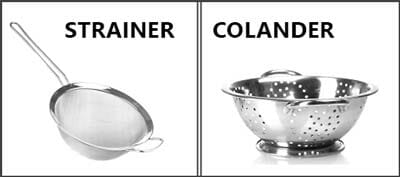Joshua @ReadyHarvest advises #BibleStudy as the #Sieve or #Colander to Use for a Regularly-Scheduled #FaithCrisis
When I saw this 'lecture' (I think he's giving it to a church, but it's not exactly a #sermon ... another word I'll 'Escribate' below), I immediately shared it with all the 'Defend Your Faith'-groups I could find on Facebook.
"It's Time for a Faith-Crisis," I think is the title of the video; and I've already 'escribated' the word 'Crisis'---which is based on words that mean "Sieve" ... 'that's a "Colander," right?' I'll see.
Ready to Harvest explains 'the faith-crisis we all need' in a video you can access through 'the emboldened link(s)' below; but first I want to teach you about those words. And I find you understand words better if you see 'the words at their base' (then going on to look at the words at those words' bases, then the words at those words' bases, etc.-etc. ad infinitum into their Foundation)
| L.O.L. |
The word “Sermon” is built on ancient words that mean "to Line-up (to Thread- or String-Together the Words)."
#Sermonette #Sermonize #Sermons #Sermonic #Sermonical #Sermonish #Sermoner (Poe used #Sermonoid #Sermuncle) #Sermonettino #Sermonized #Sermonizing #Sermocination #Sermocinator #Sermocinatrix #Sermocinate
The word “Sieve” is built on ancient words that mean "to Pour-out, |Drip, |Trickle" (see Soap, related to Sift).
That's like a Colander, except the Sieve is used (I think) for 'dry matter' (e.g. sifting the jewels & rocks out of the dust & sand). The Colander is used for 'liquid' (sifting the pasta-or-fish out of the water-or-sauce it was boiled in). Let's see ...
The word “Colander” is built on words beneath ancient words that mean "Sieve, |Strainer, |Wicker Fishing Net."
#Colandered #Cullender #Coloner #Cullyandre
When most of us think of 'a faith-crisis,' we generally think of "an urgent situation where we're faced with 'being all-wrong about our current beliefs'"--the kind of thing that turns us into atheists if we're not 'corrected' by some Bible-study and meditation with The Holy Spirit.
But that's not exactly the 'regular crisis' Joshua is suggesting---I'll copy his video's description and maybe the outline of the 10 'steps' he suggests we take; but I'll note 'one of his last points' first ...
He says that--though you should be open-minded to new points people bring up & new facts people learn--you should take a firm stance ... "Be not easily-moved," I think he quotes.
Mar 16, 2020 Most people don’t put the effort into discovering what the Bible says for themselves. Instead, human nature causes us to rely on others for what we think we know – but this means we might believe something untrue. It’s time for a faith crisis. We need to have our theological apple cart upset and learn what the Bible really says. Here's how to question your faith from a Biblical perspective. Here's the link to download the outline to use yourself https://readytoharvest.com/teachers-edition-its-time-for-a-faith-crisis/
The Ten "steps to having a biblical faith crisis" (with LOTS of notes to see on RTH's .pdf ... my notes might be 'based on RTH's notes,' but are also drawn from personal thinking/experience):
- Follow the Flawed Leadership
- They- and the rest of their followers-are following the way they were taught (just like you are); if you disagree on a Bible-interpretation, bring each point-of-difference to them ... possibly when you---
- Investigate the Truth of What is Taught
- a bit of Buddhism; see why they believe the interpretation they teach
- Don't Follow the Pace of the Church-Services
- they have their schedule-with-God; and it may influence your schedule-with-God, but more the way 'a fellow camper's pace' would influence yours
- Only Trust the Scriptures---the WHOLE Scripture!
- I'm a little confused on this point; because--although Scripture carries a grain of The Ultimate Truth--some of its teachings go against either 'others of its teachings' or 'evidence discovered more-recently than the Scriptures were written' ...
- Make a Habit of Bible-Study
- and no, that's not just "Bible-Reading"; of course it should START-WITH and/or INCLUDE Bible-Reading, but it is more 'topic-directed.'
- Listen to- and Learn from-Godly Teachers
- more Buddhism ... actually, the very definition of Buddhism: 'Following (Listening to- & Learning from-) the Already-Enlightened
- Don't Change Easily, but Be Willing to Change
- 😎
- Don't TEACH when You Need to Be Learning
- this may seem a little mixed-up, on account of "Isn't the point of Christianity to teach The Good News to the whole world? and isn't one of the points of this message that you never stop learning?"
But--aside from the Scripture RTH quotes here--I'm reminded of Jesus' parable/instruction not to 'take the high seat at the table' when you come to the banquet, but rather to sit at the low seat and only move when you're instructed to take the higher! - Conclude Your Faith-Crisis
- I also disagree (a little) with RTH here ... not 'totally' (or even 'generally'), but more in 'the way we get to it'---they imply that 'being willing to change (after you decide how a current matter affects your beliefs)' means you failed to Establish a firm belief; I ... I remember that earthquakes can destroy mountains ...
- Never Quit Investigating


Comments
Post a Comment
I appreciate your comment, and I'll probably approve it & publish it soon (give me about a week before you try to post it again when it doesn't publish immediately ... thanks)